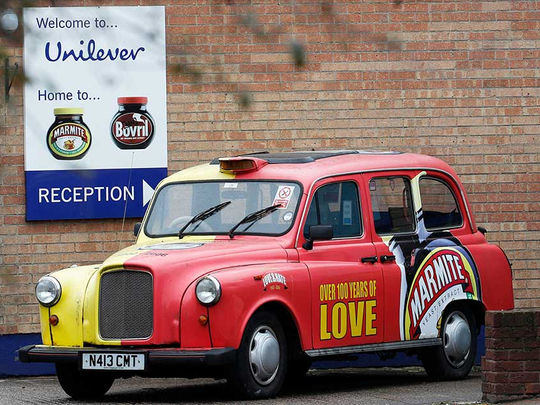
London:
Unilever has had a wake-up call from Warren Buffett and Brazilian billionaire Jorge Paulo Lemann. That isn’t a pleasant place to be.
The Anglo-Dutch consumer goods giant may have seen off their $143 billion effort to buy the maker of Magnum ice-cream and slot it into their Kraft Heinz Co. operation. But Unilever and CEO Paul Polman are still on notice.
Buffett and Lemann’s 3G Capital both saw there was fat to cut at Unilever. Now Polman has to do the job himself. He must work on the assumption Kraft Heinz will want to come back.
Under UK takeover rules, Kraft Heinz is now precluded from making a bid for six months — unless Unilever agrees, or another bidder buts the company in play. That time will pass quickly.
Kraft Heinz had already raised the bar on profitability in the consumer industry: its operating margins put those of Unilever in the shade.
Polman had set out his own cost-saving plan, borrowing Kraft Heinz’s zero based budgeting model, where any additional spending has to be funded by cost savings. He has doubled his target for expanding Unilever’s margins, and now aims for an increase of between 0.4 and 0.8 percentage points by 2019.
The difficulty is that investors haven’t given Unilever any credit. Even after the shares jumped 13 per cent on the announcement, the stock is still at a 13 per cent discount to peers on an enterprise value-to-Ebitda basis.
Polman needs to do more. He has long said Unilever is about creating long-term value — but investors can’t wait forever. At some point, he needs to deliver.
Growth in personal care, where Unilever has been investing in premium, millennial-friendly products, actually slowed in the fourth quarter.
Polman could do some of what Kraft Heinz would have wanted to do: gear up the balance-sheet and sell the under-performing spreads business.
And there is a more radical option too. It was widely assumed Polman would retire within the next couple of years. That could be brought forward.
There are several internal candidates, including finance director Graeme Pitkethly, and Amanda Sourry, who runs the foods business. Dave Lewis, CEO of Tesco Plc, had been viewed as Polman’s heir apparent when he ran Unilever’s personal care business. Having acquired Booker Group Plc and the services of its CEO Charles Wilson, he might now be available to return to Unilever.
Polman has seen off his predators for now simply by refusing to engage. Buffett, in particular, is unlikely to have wanted to get caught up in a hostile takeover. A better prepared Kraft Heinz, dangling a fatter offer with more cash, could yet push Unilever’s investors to pressure their board to talk about a deal.
It’s possible that Kraft Heinz now looks elsewhere to feed its M&A habit — margins may have peaked and revenue is weakening ... so the company needs more acquisitions.
But that doesn’t excuse Polman from having to step up a gear.
— Bloomberg












